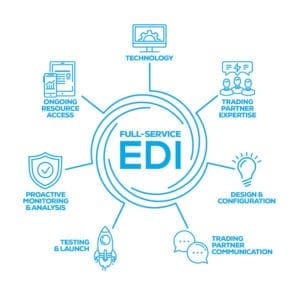How to choose EDI if you are undecided
You may have heard the pros and cons of EDI from your peers, customers, and partners, and haven’t quite been convinced the timing is right for your business to switch from manual order processing to an automated process using EDI. In short, you are not sure how to choose EDI.
Perhaps you’re asking, “what should I watch for to know when investing in EDI is worth it?” Some clues that the time has come include a growing amount of data entry and/or difficulties keeping up with changes and delivery schedules from your retailers. There isn’t a magic formula to pinpoint the exact moment in time when taking on the cost of EDI makes business sense.
The truth is that every supplier SPS Commerce works with had a different business reason or event that triggered their decision. It may have been that a large retail customer asked them to do EDI and they couldn’t say no; a staff member quit, and they saw how time-consuming manual order entry was, or their chargebacks were just too high because of errors that the cost of manual order processing became too much.
For many companies, EDI begins as complying with a retailer’s request. What they find is that most retailers will require EDI of all of their suppliers. By being EDI-ready, manufacturers are open to new business and can say “yes” to any retail opportunity with their EDI capabilities. Let’s explore the fundamental questions around beginning EDI so you can decide if the time is right for your company:
What does it cost?
The cost of EDI is calculated by the number of trading partners and the volume of orders and other transactions you’ll process. If you have a small number of retailers with just a few transactions, the monthly fees will be nominal, often less than a mobile phone bill. Costs will increase as your orders increase, but they’ll keep pace with your sales growth.
Do I need to hire staff?
It depends. If you choose a full-service (aka, all-inclusive) EDI provider, the answer is no. This way, your staff can spend their time on things only your business can do. Companies that buy EDI technology or work with a less than full-service provider usually need to hire consultants or staff to make EDI changes and troubleshoot as errors occur.
What if I don’t do EDI?
It’s not just about complying with a retailer’s request. Our users have found that EDI can open doors and allows them to partner with retailers that otherwise may not have considered your products. It also frees you and your team up to do what you do best – design and distribute your amazing products.
We fully understand that your business is your world and making it successful is your passion. If you need to learn more about EDI before making a decision, check our EDI 101 guide or schedule a demo (we promise to educate and not give a hard sales pitch).

Find the correct EDI solution for your business.
Get more insights on full-service EDI by downloading our white paper.
READ OUR WHITE PAPER- SPS Commerce Named #1 IT Infrastructure Software by G2 - February 25, 2025
- Optimizing RTV: The key to smarter supply chain management - January 6, 2025
- E-invoicing: all the basics you need to know - December 16, 2024

RELATED POSTS
Tackling omnichannel order management...
Improve the order-to-cash process to ...
Best Practices to Drive Sell-Through